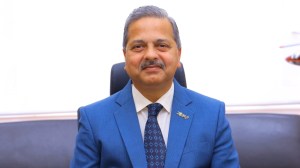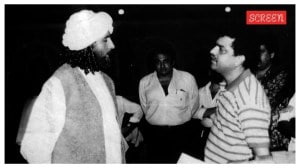‘Give me justice for son’s murder, not this funeral cheque’
The deaths of more celebrated political personalities will adjourn Parliament tomorrow—not that of a young man from this dilapidated ho...

The deaths of more celebrated political personalities will adjourn Parliament tomorrow—not that of a young man from this dilapidated house in a remote Bihar village, 5 km from the last telephone pole.
The murder of Satyendra Kumar Dubey, an IIT graduate who was building the Prime Minister’s dream Golden Quadrilateral, is not exactly the stuff political debates are made of.
Dubey was shot last week by ‘‘unidentified assailants,’’ a year after he blew the whistle on the contract mafia and alleged corruption in NHAI, where he worked as a project director, in a letter to the PMO in which he pleaded confidentiality. His name was passed around with the complaint—exposed by The Sunday Express—there was no crackdown on corruption and the dream of a poor family lay dead on a kindless Bihar night last week.
The pyre that burnt her son’s body was doused long ago, but not the one in Phulmati Devi’s mind. In brief interruptions between a deep numbness, she calls out for Satyendra. Working hard to earn an IIT degree and a Class I job, he had made proud not only his parents, but this entire village.
The house of the man in charge of a Rs 450 crore project is slowly falling apart. His life’s savings are limited to a motorcycle and a mobile phone that was found missing after his murder. ‘‘The whole world’s money was not enough to buy off my brother,’’ says Dhanajay, the youngest of five sisters and two brothers. ‘‘He was stubbornly honest. I could speak about bhaiya for hours,’’ Dhanajay, a B Tech student at BHU says. At this house this afternoon, he is the only one who has the energy to speak. The rest can only cry.
Unable to sustain his large family with the unpredictable farming income from the small holding, Bageshwari Dubey worked as a clerk in a nearby sugar mill. Satyendra, his second son, did not disappoint him. He made a habit of bucking the trend. ‘‘Even today there is none in the vicinity who went as high as he did. On vacations, he used to play with children and encouraged them to study hard,’’ recalls childhood friend Sudhamay Yadav.
After passing the Class X from the Gang Baksh Kannaudi HS, he left for Allahabad for his Class XI and XII and qualified for IIT Kanpur, (Civil), in 1990. He remains the only IIT graduate from the school. And last week, the school ground doubled up as the cremation ground for its favourite student.
Satyendra financed the studies of Dhanajay and two sisters, Baby and Kusum, training in Delhi to be teachers. In the process, he forgot his own marriage. ‘‘But there were some proposals recently,’’ says Dhananjay.
Even after he joined the government as an Indian Engineering Service (IES) officer, Satyendra chose not to swim along the tide. Within months after joining the Ministry of Surface transport in Delhi he was offered his first bribe—left on his table in an envelope. A clerk later entered his cabin to check if ‘‘saheb’’ had seen the lifafa. Satyendra picked up the phone to call the police, but let the clerk off after warning him.
In 2001, he went to the NHAI on a three-year deputation and was posted in Koderma, Jharkhand in Section 5, as project manager of 5 B, a 80-km, Rs 450-crore-worth stretch. There he made his mark, much to the discomfort of too many.
‘‘He would ride his bike to the quarry to inspect the quality of stone, count each equipment to ensure that the contractor met the commitment. Once he made one particular contractor reconstruct a stretch of six km after discovering the work inferior,’’ remembers Dhananjay who spent time with his brother last summer. ‘‘It was boiling hot. But he visited sites four to five times weekly, compared to the usual practice of once in months,’’ he recalls.
‘‘He just could not stand compromise in work quality,’’ the brother remembers. After threatened with departmental action for writing to the PM, he was transferred to Gaya. ‘‘‘I got the reward for the hardwork,’ he told me,’’ recalls Dhananjay.
Satyendra then appeared for a departmental interview and was selected as Deputy GM of NHAI, at the project site he would be called Project Director and his name was finalised for the Koderma Project Implementation Unit (PIU), handling the 5,200-km stretch. Someone perhaps wanted to pre-empt it. The weapon used in his murder was highly sophisticated, not the kind used by roadside robbers.
Dhananjay says his brother never told him about threats, however. ‘‘He couldn’t care less even if there was any. He always thought and acted upon his objectives, in this case quality work,’’ Dhanjay says.
With Satyendra gone, his family believes bringing the culprit to the book is a must before they could pick up the threads of their life. ‘‘My mother is clutching on to the photograph of bhaiya. My father has refused to cash a cheque given by the NHAI for funeral expenses. He says he wants justice first, not money,’’ says Dhananjay.






- 01
- 02
- 03
- 04
- 05

























